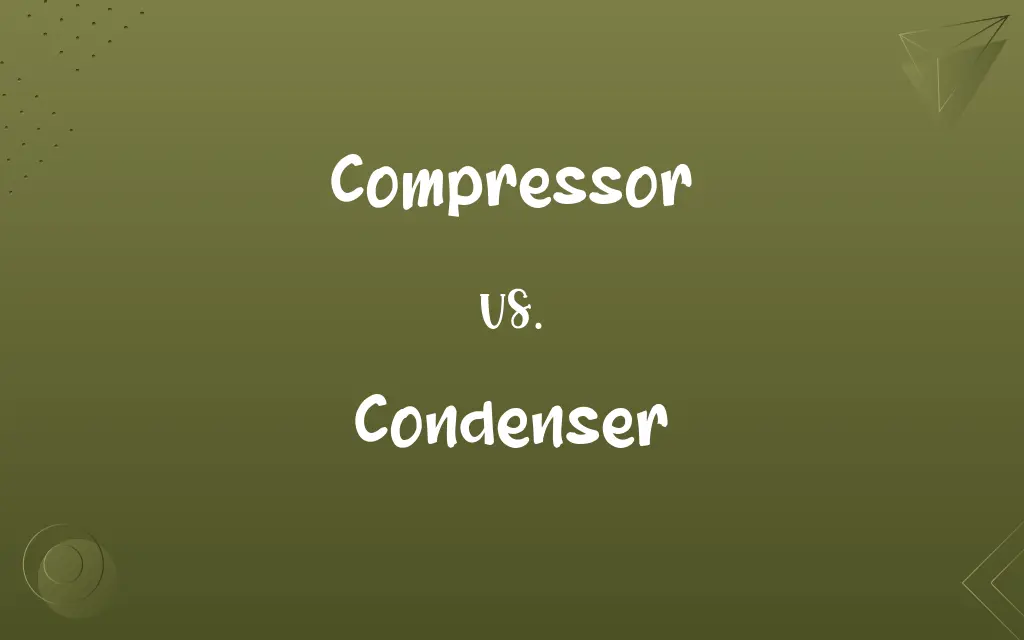Compressor vs. Condenser: Know the Difference

By Hifza Nasir & Shumaila Saeed || Published on November 28, 2024
Compressors increase the pressure of refrigerant gas, while condensers cool it down, converting it back to a liquid form for cooling systems.

Key Differences
Compressors play a crucial role in refrigeration and air conditioning systems by increasing the pressure of the refrigerant gas, which raises its temperature. This process is essential for the refrigeration cycle, enabling the refrigerant to absorb heat from the environment. Condensers, on the other hand, are designed to remove this heat from the compressed gas, allowing it to condense and change back into a liquid form. This transition is vital for the system's efficiency and its ability to cool a space effectively.
Shumaila Saeed
Nov 28, 2024
The compressor is the heart of the refrigeration system, driving the refrigerant through the cycle and ensuring continuous flow. It is powered by electricity and is typically located at the beginning of the cooling cycle. The condenser, acting as a heat exchanger, is positioned after the compressor and plays a key role in expelling the absorbed heat to the outside environment. Without the condenser's function, the refrigeration cycle would not complete, preventing the system from cooling.
Hifza Nasir
Nov 28, 2024
Compressors vary in type, including reciprocating, rotary, and screw, depending on the application and size of the system. Each type has its specific mechanism for compressing refrigerant. Condensers also come in various types, such as air-cooled, water-cooled, and evaporative, each utilizing different methods to dissipate heat and condense the refrigerant.
Hifza Nasir
Nov 28, 2024
Maintenance requirements for compressors involve lubrication, checking for leaks, and ensuring they operate within designed pressure ranges to avoid overheating or failure. Condensers require regular cleaning to remove debris and ensure adequate airflow or water flow for efficient heat transfer.
Hifza Nasir
Nov 28, 2024
The efficiency of both components is critical for the overall performance of cooling systems. A well-maintained compressor and condenser can significantly reduce energy consumption, lower operating costs, and extend the system's lifespan.
Hifza Nasir
Nov 28, 2024
ADVERTISEMENT
Comparison Chart
Function
Increases pressure and temperature of refrigerant gas
Cools down and condenses refrigerant gas back into liquid
Shumaila Saeed
Nov 28, 2024
Role in System
Drives the refrigerant through the cooling cycle
Removes absorbed heat and completes the refrigeration cycle
Hifza Nasir
Nov 28, 2024
Maintenance
Lubrication, leak checks, pressure monitoring
Cleaning for efficient heat transfer, airflow or water flow maintenance
Dua Fatima
Nov 28, 2024
Impact on Efficiency
Essential for refrigerant flow and heat absorption
Critical for heat expulsion and system cooling efficiency
Dua Fatima
Nov 28, 2024
ADVERTISEMENT
Compressor and Condenser Definitions
Compressor
A device that increases the pressure of refrigerant gas.
The air conditioner's efficiency relies on the compressor's ability to pressurize the refrigerant.
Hifza Nasir
Feb 28, 2024
Condenser
Requires debris removal and cleaning.
Cleaning the condenser coils is essential for maintaining efficiency.
Shumaila Saeed
Feb 28, 2024
Compressor
Requires regular maintenance.
Regular checks on the compressor can prevent system failures.
Hifza Nasir
Feb 28, 2024
Condenser
Affects the system's overall cooling capacity.
A blocked condenser can lead to decreased cooling performance.
Hifza Nasir
Feb 28, 2024
Compressor
A device that produces pressure, such as a gas compressor that produces pressurized gas.
Hifza Nasir
Feb 27, 2024
ADVERTISEMENT
Condenser
A unit that condenses refrigerant from gas to liquid.
The condenser plays a crucial role in expelling the system's heat outdoors.
Shumaila Saeed
Feb 28, 2024
Compressor
Powers the refrigeration cycle.
A malfunctioning compressor can halt the entire cooling process.
Hifza Nasir
Feb 28, 2024
Condenser
Utilizes air, water, or evaporative methods for cooling.
Water-cooled condensers are common in industrial refrigeration.
Hifza Nasir
Feb 28, 2024
Compressor
Varies by system size and application.
Large cooling systems often use screw compressors for their efficiency.
Shumaila Saeed
Feb 28, 2024
Condenser
Critical for completing the refrigeration cycle.
Without the condenser, the refrigerant cannot return to a liquid state for reuse.
Hifza Nasir
Feb 28, 2024
Compressor
Directly impacts energy consumption.
A high-efficiency compressor can significantly reduce energy costs.
Dua Fatima
Feb 28, 2024
Repeatedly Asked Queries
What happens if the condenser is not working properly?
The system's ability to expel heat is compromised, reducing its cooling efficiency.
Dua Fatima
Nov 28, 2024
How does a condenser contribute to the refrigeration cycle?
By cooling and condensing the high-pressure refrigerant gas back into a liquid, it completes the cycle.
Hifza Nasir
Nov 28, 2024
Can a cooling system function without a compressor?
No, the compressor is essential for moving the refrigerant through the system.
Hifza Nasir
Nov 28, 2024
Can the efficiency of a condenser decrease over time?
Yes, especially if not properly maintained, leading to reduced heat transfer efficiency.
Hifza Nasir
Nov 28, 2024
What is the main function of a compressor in a cooling system?
To increase the pressure and temperature of the refrigerant gas, driving it through the system.
Shumaila Saeed
Nov 28, 2024
Are all compressors the same?
No, they vary in type and size, tailored to specific system requirements.
Dua Fatima
Nov 28, 2024
Is it possible to upgrade a compressor for better efficiency?
Yes, replacing an older compressor with a more efficient model can improve system performance.
Hifza Nasir
Nov 28, 2024
How does a water-cooled condenser differ from an air-cooled one?
It uses water to remove heat from the refrigerant, often more efficiently in certain conditions.
Shumaila Saeed
Nov 28, 2024
What are common signs of compressor failure?
Increased energy usage, reduced cooling capacity, or complete system shutdown.
Hifza Nasir
Nov 28, 2024
Why is regular maintenance important for condensers?
To ensure efficient heat transfer and prevent system inefficiencies or failures.
Hifza Nasir
Nov 28, 2024
What safety precautions are necessary when maintaining compressors?
Ensuring the system is powered off and following manufacturer guidelines to prevent accidents.
Hifza Nasir
Nov 28, 2024
What role does the compressor play in energy consumption?
It's a major consumer of energy in the system, so its efficiency greatly affects overall energy use.
Shumaila Saeed
Nov 28, 2024
How does the type of condenser affect a cooling system?
It influences the method and efficiency of heat expulsion, affecting overall performance.
Shumaila Saeed
Nov 28, 2024
Why might a system have multiple compressors?
For larger systems, to meet cooling demands efficiently and provide redundancy.
Dua Fatima
Nov 28, 2024
How do environmental conditions affect condenser performance?
Extreme temperatures, debris, and airflow restrictions can all impact efficiency.
Shumaila Saeed
Nov 28, 2024
Share this page
Link for your blog / website
HTML
Link to share via messenger
About Author
Written by
Hifza NasirCo-written by
Shumaila SaeedShumaila Saeed, an expert content creator with 6 years of experience, specializes in distilling complex topics into easily digestible comparisons, shining a light on the nuances that both inform and educate readers with clarity and accuracy.









































































